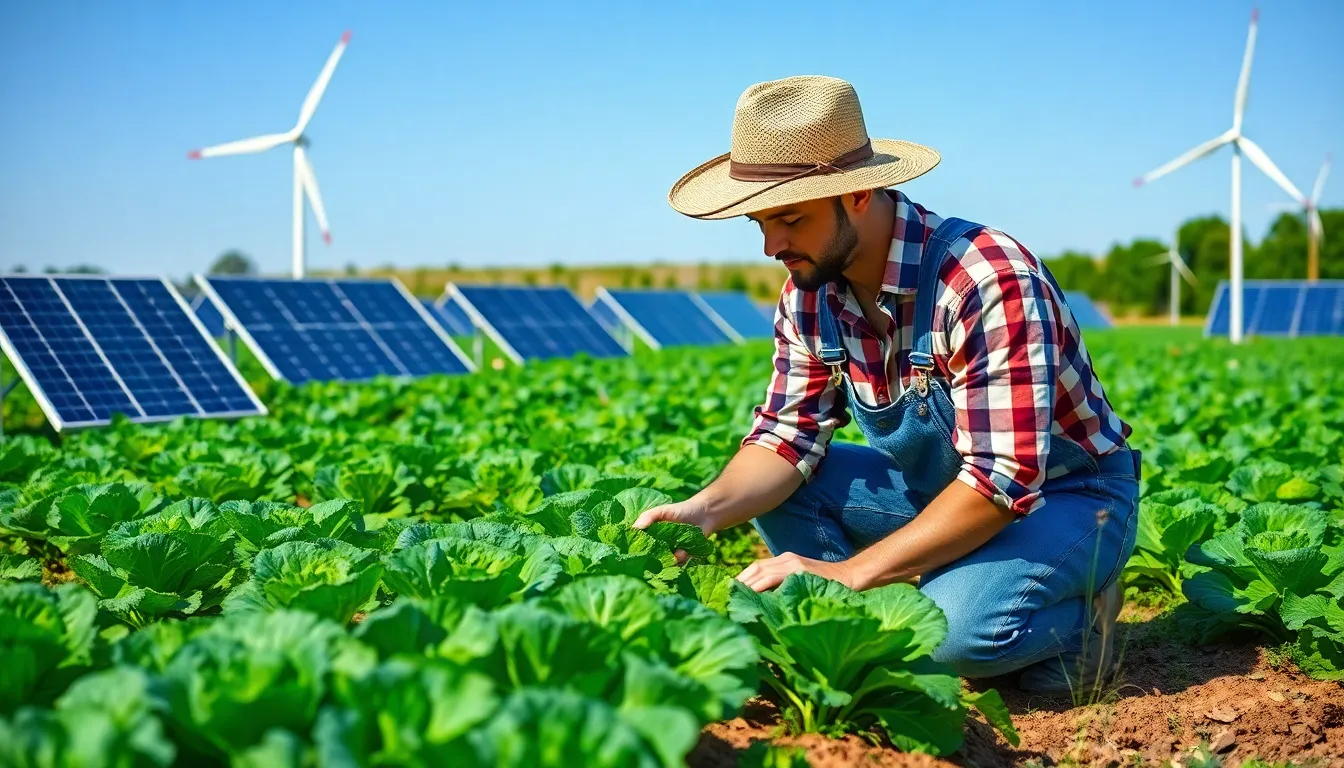In a world where the only thing growing faster than technology is the population, sustainable farming technology is stepping up to the plate like a superhero in overalls. Imagine a farm where drones deliver seeds faster than a pizza delivery guy and sensors monitor soil health more accurately than a hypochondriac at a doctor’s office. This isn’t the future; it’s happening now, and it’s transforming how we think about food production.
Farmers are trading in their traditional tools for cutting-edge innovations that promise not just to feed the world but to do so without draining its resources. With climate change knocking at the door, sustainable farming technology isn’t just a trendy buzzword; it’s a necessity. So, buckle up as we explore how these advancements are revolutionizing agriculture and ensuring that our planet stays as green as our thumbs.
Table of Contents
ToggleWhat Is Sustainable Farming Technology?
Sustainable farming technology focuses on environmentally friendly practices designed to optimize agricultural production. This technology includes tools and methods that minimize negative impacts on the environment while maintaining profitability. Innovations in this field range from precision agriculture to renewable energy solutions.
Precision agriculture uses data analytics and technology to make farming more efficient. Sensors monitor soil health, crop conditions, and pest populations, enabling farmers to make informed decisions. Drones provide aerial surveillance, reducing the need for excessive pesticide use and allowing targeted interventions.
Renewable energy solutions harness solar and wind power to reduce the reliance on fossil fuels. This shift not only lowers greenhouse gas emissions but also often leads to cost savings in energy expenditures. Biogas generation from organic waste offers another avenue for sustainable energy in farming operations.
Water conservation technologies play a significant role in enhancing resource management. Drip irrigation systems deliver water directly to plant roots, minimizing evaporation and wastage. Rainwater harvesting systems collect and store precipitation for use during dry periods.
Ecological practices emerge as another critical component of sustainable farming technology. Crop rotation and cover cropping improve soil fertility and reduce erosion. Integrated pest management combines biological controls with limited use of chemical treatments, promoting biodiversity.
Overall, sustainable farming technology represents a necessary evolution in agriculture, driving productivity while nurturing the planet. Innovators and farmers leverage these advancements to meet the demands of a growing population without compromising environmental integrity.
Benefits of Sustainable Farming Technology

Sustainable farming technology brings numerous advantages across environmental, economic, and social dimensions. These benefits contribute to a more efficient agricultural system.
Environmental Impact
Sustainable farming technology significantly reduces ecological footprints. Precision agriculture decreases chemical usage, promoting healthier ecosystems. Water conservation practices protect vital water resources. Renewable energy solutions like solar power replace fossil fuels, cutting greenhouse gas emissions. Biodiversity benefits from ecological practices such as crop rotation. Improved soil health results from using organic fertilizers and integrated pest management. These combined practices foster environmental resilience.
Economic Advantages
Sustainable farming technology leads to cost savings for farmers. Reduced inputs like fertilizers and pesticides lower operational expenses. Increased crop yields enhance profitability. Adoption of renewable energy sources often results in long-term savings on utility bills. Market demand for sustainably sourced products continues to rise, offering new revenue streams. Economies of scale become achievable through improved efficiency. Farmers can capitalize on these advantages, strengthening their financial stability.
Social Implications
Socially, sustainable farming technology supports community well-being. Access to nutritious, sustainably grown food increases health outcomes. Employment opportunities arise in sectors like renewable energy and precision agriculture. Education and training in these technologies empower farmers and enhance skill sets. Communities benefit from local food systems that reduce transportation emissions. Collaborative efforts in sustainable practices foster stronger agricultural networks. Overall, these technology advancements contribute positively to society.
Types of Sustainable Farming Technology
Sustainable farming technology includes various innovative practices that positively impact agriculture. These technologies enhance efficiency while prioritizing environmental health.
Precision Agriculture
Precision agriculture utilizes advanced data analytics for monitoring soil health and crop conditions. Farmers employ GPS mapping and remote sensing to determine optimal planting times and fertilizer applications. By collecting specific data, they improve yields while minimizing resource waste. For instance, targeted irrigation reduces water usage, addressing the challenges posed by water scarcity. Consequently, these practices align agricultural productivity with sustainability goals.
Organic Farming Techniques
Organic farming techniques emphasize natural methods to enhance soil fertility and pest control. Farmers rely on composting, cover cropping, and crop rotation to maintain nutrient-rich soil. This approach prevents chemical runoff and encourages biodiversity in ecosystems. For example, using beneficial insects can control pests without pesticides. Additionally, organic certification caters to consumer demand for sustainably sourced products, providing economic incentives.
Renewable Energy Sources
Renewable energy sources, including solar and wind power, significantly reduce fossil fuel dependence in agriculture. Solar panels on farms can generate electricity for irrigation systems and equipment. Wind turbines provide alternative energy options, lowering operational costs. Transitioning to these energy sources not only cuts greenhouse gas emissions but also promotes energy independence. Farmers adopting these technologies enhance the sustainability of their operations while contributing to a cleaner environment.
Challenges in Implementing Sustainable Farming Technology
Implementing sustainable farming technology presents various challenges that farmers must navigate. Cost barriers and education needs are two critical issues affecting adoption.
Cost Barriers
Initial investments in sustainable farming technology can be significant. Many farmers face financial constraints, which limit their ability to purchase advanced equipment. For example, precision agriculture tools such as drones and soil sensors often come with high price tags. Smaller farms feel this burden the most, making it harder to compete with larger operations that can more easily absorb these costs. Without financial support or incentives, many might hesitate to adopt these effective solutions.
Education and Training Needs
Education and training remain crucial for successfully adopting sustainable farming practices. Farmers need access to information about new technologies and methods. Workshops and training programs can empower farmers with essential skills. Moreover, local agricultural extension services play a vital role in disseminating knowledge about sustainable techniques. However, limited outreach and availability of resources can hinder widespread implementation. Access to technical support also becomes critical in maintaining these technologies effectively.
Future Trends in Sustainable Farming Technology
Emerging trends point towards a transformative future in sustainable farming technology. These advancements promise to enhance agricultural productivity while safeguarding the environment.
Innovations on the Horizon
Smart sensors and artificial intelligence technologies are expected to revolutionize farming practices. These innovations facilitate real-time monitoring of crop health, enabling farmers to make data-driven decisions. Autonomous robots may aid in planting, harvesting, and weeding, significantly reducing labor costs. Vertical farming techniques will likely gain traction in urban areas, maximizing space usage and minimizing land impact. Integrating blockchain technology could enhance transparency in the food supply chain, ensuring consumers are informed about sourcing practices.
Collaboration and Partnerships
Public-private partnerships are increasingly pivotal in advancing sustainable agriculture. Collaborative efforts between tech companies and agricultural researchers foster innovative solutions tailored to farmers’ needs. NGOs often engage with local communities to promote sustainable practices and knowledge sharing. Government initiatives may provide funding for research and development, incentivizing adoption of new technologies. Shared resources and expertise among stakeholders can accelerate growth, creating a more resilient agricultural sector.
Sustainable farming technology is reshaping agriculture for a better future. By integrating innovative tools and practices, it addresses critical challenges like climate change and resource depletion. The shift towards precision agriculture, renewable energy, and water conservation not only enhances productivity but also promotes environmental stewardship.
As farmers embrace these advancements, they pave the way for a more resilient agricultural sector. Collaboration among stakeholders will be vital in overcoming barriers to adoption. With continued support and education, sustainable farming technology can ensure food security while nurturing the planet for generations to come. The future of agriculture looks promising, driven by technology that prioritizes sustainability and efficiency.






